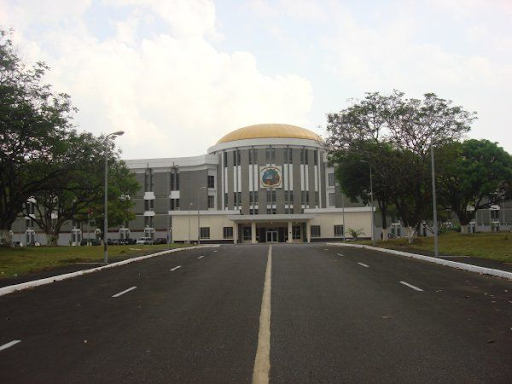Liberia: LPP Wants Lawmakers Prevent Road Fund Misappropriation

The Capitol building, Liberia.
The Liberian People’s Party (LPP) has called on Lawmakers to prevent President George Manneh Weah’s administration from the misappropriation of the country’s road fund.
According to the party press release, the misuse of the road fund money by the Weah administration is a violation of the 2009 Public Financial Management (PFM) law. The Party said in a press release that the recent illegal and controversial use of the US$25 million from the Road Fund of 2019 for unexplained purposes is unacceptable and should no longer be allowed by the lawmakers.
The Minister of Finance and Development Planning, Minister Samuel Tweah, recently appeared on a local radio talk show and explained that due to economic constraints facing the country, money allocated to or generated from the Road Fund was used for a different purpose. He argued that such use of the money was in consultation with the legislature.
The revelation of the road fund money usage by Minister Tweh has come under very serious criticism by the Liberian public. “The General Auditing Commission (GAC) has revealed that the Weah administration used USD25 million for unexplained purposes which is a blatant violation of Section 2.2 of the Act establishing the National Road Fund,” the Party’s release noted.
The LPP has continued to criticize the Weah government on how monies are being spent to manage the economy.
In August of 2021, LPP, in its press release published in local newspapers, called on President Weah to explain why the government reduced public spending by 63%, from US$115 million in 2019/20 to US$42 million in 2021, 2022, and 2023; and subsequently increased payments by 170% to the State-owned bank, Central Bank of Liberia (CBL) in the four fiscal periods.
In the publication, LPP added that it accepts the theory and practice that governments can cut allocations for priority programs such as allocations for “goods and services” and increase payments to creditors. Yet, the party noted in the publication that the 63% (US$115 million minus US$73 million) cuts in appropriations for “goods and services” in 2021, 2022, and 2023 have affected and will continue to affect both government operations and the economy in general.
LPP said despite the concern raised, the government has continued to project the same scenario today. “And the government’s assertion was that it was cash-strapped in 2019; therefore, it used the ‘legally restricted’ road funds,” the release explained.
The LPP stated that though the government has justified the use of the money because of economic difficulty, budgetary transactions of 2019 do not support the assertions that the government was broke.
“The Weah administration received US$65 million from foreign creditors and US$53 million from local commercial banks in 2019 as mentioned in the Central Bank of Liberia 2019 annual report.
According to the party, CBL printed L$4.0 billion additional banknotes, and the government reported its revenue surplus increased from US$22 million in 2018 to US$42 million in 2019.
The release quoted a U.S. Embassy press release as the government’s L$16.5 billion banknotes, which was additional cash owned by the government, were infused into the Liberian economy. The Party further argued in its release that the Weah administration paid US$35 million to the CBL in 2019/2020, an indication that the government was not cash-strapped, as claimed by the Finance Minister.
“The donors gave about US$584 million in 2018/2019 to Liberia, which nongovernmental agencies and some governmental agencies spent on government programs,” the Party claimed in its release.
The LPP stated that the lessons from these different budgetary records indicate that President Weah’s administration is not following the public financial management law.
“For instance, the Weah administration borrowed US$53 Million from commercial banks; however, its 2019/2020 budget did not project any borrowing from domestic sources. Moreover, the administration is regularly defaulting on redeeming treasury bonds and treasury bills, strangulating commercial banks, in violation of the six-month pay-back requirement,” the party further asserted.
Meanwhile, the LPP has called on Lawmakers to further revisit the 2022 budget and review significant appropriations in line with recommendations from the U.S. Treasury Department 2021 report which, among others, asked for a meticulous review of the national budget and demanded answers from the Executive, published financial statements from the state-owned enterprises including debt and contingent liabilities, among other concerns.
